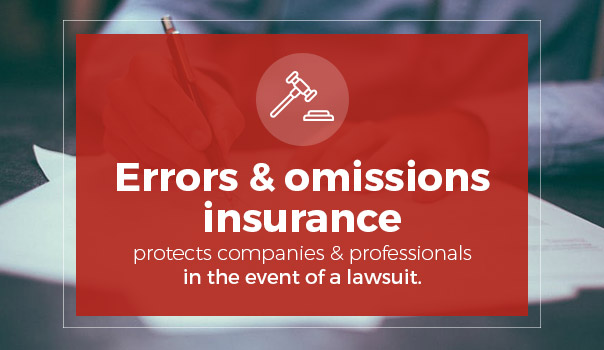Errors and Omissions Insurance | E&O Insurance
The Ins and Outs of Errors and Omissions Insurance, E&O Insurance
Contact us for a no obligation errors and omissions insurance quote today!
What is E&O Insurance?
Errors and Omissions insurance, commonly known as E&O insurance, is a form of professional liability insurance designed to protect employees and employers against clients’ claims of negligence or inadequate work. E&O policies usually cover legal costs associated with the claim and most or all of the ensuing settlement, though a policy may not cover the entire settlement if the amount exceeds the limit specified in the insurance contract.
In many industries, lawsuits happen whether the associated claims are legitimate or not. For example, a graphic designer is sued after creating a trademark that another business claims is similar to their trademarked logo. Court costs are normally high even if the claim is baseless and ends in the defendant’s favor. In such a case, E&O insurance could financially protect the graphic designer during a costly legal battle.
Why do I need Errors and Omissions Coverage?
To put it very simply, everyone makes mistakes. Even with the best employees and the best risk management practices in place, mistakes will be made. No one is perfect.
Errors and Omissions insurance is useful whenever you or your employees provide a service that a client could claim is inadequate or tied to negligence. For example, if you are a real estate agent, you may find yourself facing a lawsuit if a homeowner finds defects in their new property after closing. This homeowner may allege you did not disclose the defects and try to collect based on the diminished value of the home.
To illustrate another example, imagine that you are hired as a branding consultant to help revive a struggling company. If the innovative techniques that you employ are not enough to keep the business open, the company’s owner may try to blame you and file a lawsuit.
No matter how baseless both claims are, they can tie you up in legal fees –something that can be avoided with the purchase of an E&O insurance policy.
Even if you already own a Business Owners Policy, you are not protected from lawsuit-related costs. Errors and Omissions insurance is necessary for proper protection against professional liability claims.
Who needs E&O Insurance?
Errors and Omissions insurance is also applicable to businesses outside the financial industry including nonprofits, general maintenance companies and contractors, and engineering firms. Any other company or professional who provides a service such as wedding planners and printers also need E&O insurance. Doctors, dentists, and other medical professionals also take out E&O insurance called malpractice insurance.
If you are in the business of providing a service to your client for a fee, you have an E&O exposure. You may want to consider what will happen if the service is not done correctly or on time, and it costs your client money or harms their reputation.
A person or company with numerous litigation problems has a higher underwriting risk and is likely to find E&O insurance more expensive or less favorable in its terms as a result.

Understanding E&O Insurance
Errors & Omissions Insurance also known as (E&O or Professional Liability Insurance) can be an integral part of protecting your business. Accusations of negligence, or the failure to perform your professional services are examples of things that any professional business can be sued for, even if it has not made a mistake. Errors and Omissions Insurance protects the business and employees if they are sued by clients for any actual or alleged negligent act.
You should consider Errors & Omissions Insurance if your business:
- Required by Clients to have E&O insurance
- Regularly gives advice
- Provides any professional service.
Is E&O Insurance Legally Required?
While not all types of businesses are required by law to carry this coverage, some professionals are required by regulatory or licensing boards within their profession to have it. In more than 10 states, for example, real estate agents are required to show proof of E&O coverage before they receive their licenses.
While local or state laws may or may not expressly require some types of professionals to carry E&O coverage, other laws regarding their duty of care to clients make it a necessity. Additionally, you should seriously consider errors and omissions insurance coverage if your business provides a professional service or regularly gives advice.


